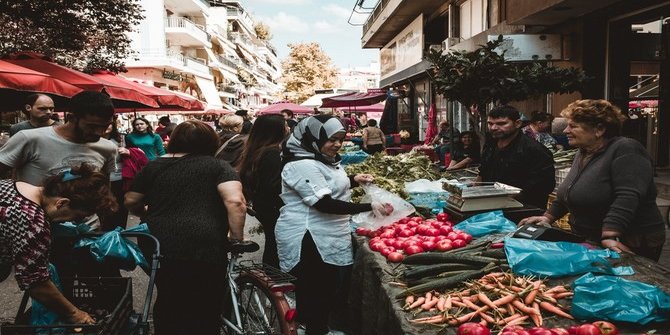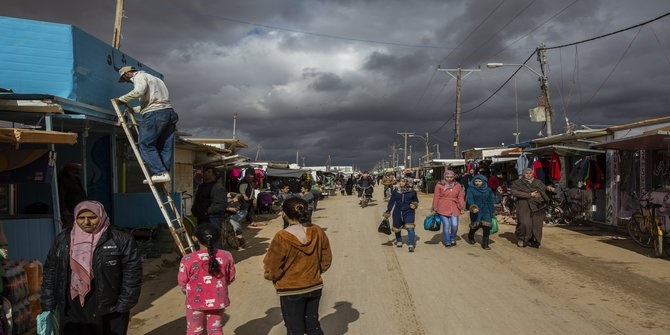by Brigitte Herremans

The earthquake that struck Turkey and Syria has shown once more Syrians’ unfathomable isolation. For one, the bogus international response reinforced the feeling of Syrians, both in opposition-controlled and government-controlled territory, of not being relevant to this world. The failure to rescue survivors in the north-west, painfully symbolises the inability to bring an end to impunity. In addition, the Assad regime seized this disaster to strengthen its control and further weaponise aid efforts. Meanwhile, donors are attempting to organise a comprehensive response for victims, with the EU donor conference on 20 March as a landmark event.
Syrians’ Worldlessness
While the earthquake knows no borders, the international response was marked by a clear border. This was prompted by political considerations and dictated by the Assad regime that obstructs relief to north-west Syria. Whereas international teams immediately arrived in Turkey, the UN failed to mobilise teams to rescue survivors in Idlib province, the area that was struck the hardest, sending the signal that their lives were not worth saving. Additionally, aid was barred from entering the first week as the UN complied with the regime’s dictate to use all but one border crossing, Bab al-Hawa, to deliver cross-border assistance. The only trucks that entered Syria the first week were those of the corpses of victims who lived in Turkey. Syrian novelist Khaled Khalifa posits that ‘the meagre aid that the world promised did not arrive, and people had nothing but their nails to dig up their loved ones under the rubble.’ A week after the quake, the regime cynically agreed to open two additional border crossings for three months.
The regime seizes the quake as an opportunity to further enrich itself. Evidently, it also thwarts relief efforts in areas under its control. Human rights researcher Sema Nassar underlines that civilians in Aleppo and Latakia, hit by the quake, organised rescue efforts themselves and faced extortion by militia’s. Although the international community quickly tried to mobilise rescue teams and stepped up aid to Damascus, via UN bodies and the Syrian Red Crescent Organisation, beneficiaries have hardly benefited from these efforts. Aid efforts in Damascus are led by the ‘Higher Relief Committee’, which arranges UN requests for humanitarian access with government ministries, controlled by the intelligence forces. This system is kept in place to the benefit of regime warehouses. Moreover, international aid has been sold and confiscated by regime-affiliated groups. The quake provides the regime with another opportunity to rob its civilians and to step up the erasure of its crimes. Yasmeen Almashan, of the Caesar Families Association, stresses that this disaster compounds the crisis of the over 100,000 forcibly disappeared and missing, as there is a lack of clarity about the casualties and the situation in the prisons, giving the regime the chance to further erase evidence. In addition, it takes advantage of the confusion over the impact of sanctions to plead for them to be lifted. Yet, sanctions do not lie at the origin of the crisis: the regime’s war against its citizens does.
A Delusional UN Catch-22?
Faced with the manipulations of the regime and other spoilers, governments in the Global North and the UN will continue navigating this quagmire. The question is whether they have sufficiently fought back. The UN recognises it has failed Syrians. To justify this failure, officials allude to a catch-22: the UN wants to live up to the humanitarian imperative, and this involves making compromises. Yet, these compromises have meant conceding to regime demands resulting in dubitative deals over operational matters, problematic procurement contracts and the recruitment of regime loyalists’ relatives. Hence, the UN has given precedence to political over human rights considerations, invoking the need for caution. This caution reached an all-time low when the UN waited for eight days for Assad to approve use of the border crossings of al-Rai and Bab al-Salama. However, it could have gotten aid in earlier as Turkey opened these crossings on the third day.
It is undeniable that the UN finds itself between a rock and a hard place. But what if the catch-22 is not the main cause of the failure to live up to the humanitarian imperative? A group of legal experts argues that UN organisations do not need regime permission, nor a mandate from the Security Council to deliver cross-border aid. International humanitarian law requires states to implement, or at least facilitate, the delivery of life-saving aid to those affected. Yet, Syrians were left alone in the face of one of the biggest disasters in decades, while the UN waited for Assad’s permission, allowing him to step up the fight against his people.
Syrian CSOs as a Main Rescue Force
While the international response failed, Syrian civil society organisations came to the rescue of civilians. Had it not been for their efficiency, the situation would have been even more disastrous. Groups such as The White Helmets epitomised the bravery of Syrians who had no choice but to become humanitarians. Nascent Syrian civil society organisations (CSOs) face extreme challenges as they lack resources and operate in egregious conditions. Maria al-Abdeh, director of Women Now for Development highlights that NGO-workers witness extreme harm and have to deal with cynical games between political factions who equally try to make a gain out of the suffering.
Despite the extreme conditions, the lack of resources and financial difficulties, Syrian CSOs have been more efficient than states and UN institutions. This phenomenon is not new. Pursuing justice for Syrians, CSOs have spearheaded initiatives at a time when the international institutional justice mobilisation has declined. In doing so, they generated initiatives in the fields of documentation, criminal accountability and truth-seeking. While justice efforts might seem far removed from the ongoing relief operations, both are intricately linked as they reveal weaknesses in the international political and humanitarian system and the problematic relations with the regime.
In the run-up to increased international efforts, states and multilateral institutions need to remedy some of their blunders and consider how their policies do no further harm. Firstly, they need to find better ways to protect civilians in the north-west, an area that has been subjected for years to the regime’s annihilation policies and that became the football of power games between the regime, jihadi groups and Turkey. A key aspect to highlight here is the efficiency of Syrian civil society that has proven to be a light in the darkness. Secondly, states need to curb Assad’s enthusiasm about turning this disaster into a chance to further escalate the war against his people.
The author wants to thank Maria al-Abdeh, Yasmen Almashan, Sema Nassar and Khaled Khalifa for contributions to this article.
[To read more on this and everything Middle East, the LSE Middle East Centre Library is now open for browsing and borrowing for LSE students and staff. For more information, please visit the MEC Library page.]






